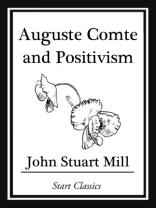One of the foremost figures of Western intellectual thought in the late 19th century, John Stuart Mill offered up examinations of human rights, personal and societal rights and responsibilities, and the striving for individual happiness that continue to impact our philosophies, both private and political, to this day. This concise but explosive essay is perhaps the best example of how far-reaching-and necessary on an ongoing basis-his thinking was. In this 1865 work, Mill discusses the rational "religion" of French philosopher and social scientist Auguste Comte, reviewing his fellow thinker’s great treatise on human behavior as knowable, quantifiable, and correctable from both positive and negative angles, "endeavouring to sever, " the author writes, "what in our estimation is true, from the much less which is erroneous." English philosopher and politician JOHN STUART MILL (1806-1873) served as an administrator in the East Indian Company from 1823 to 1858, and as a member of parliament from 1865 to 1868. Among his essays on a wide range of political and social thought are Principles of Political Economy (1848), Considerations on Representative Government (1861), and The Subjection of Women (1869).
John Stuart Mill
Auguste Comte and Positivism [PDF ebook]
Auguste Comte and Positivism [PDF ebook]
قم بشراء هذا الكتاب الإلكتروني واحصل على كتاب آخر مجانًا!
لغة الإنجليزية ● شكل PDF ● صفحات 117 ● ISBN 9781627936231 ● الناشر Start Classics ● نشرت 2013 ● للتحميل 3 مرات ● دقة EUR ● هوية شخصية 2838577 ● حماية النسخ Adobe DRM
يتطلب قارئ الكتاب الاليكتروني قادرة DRM












